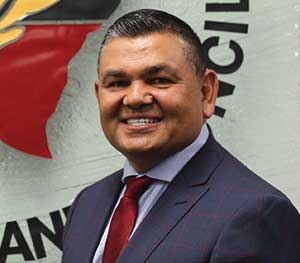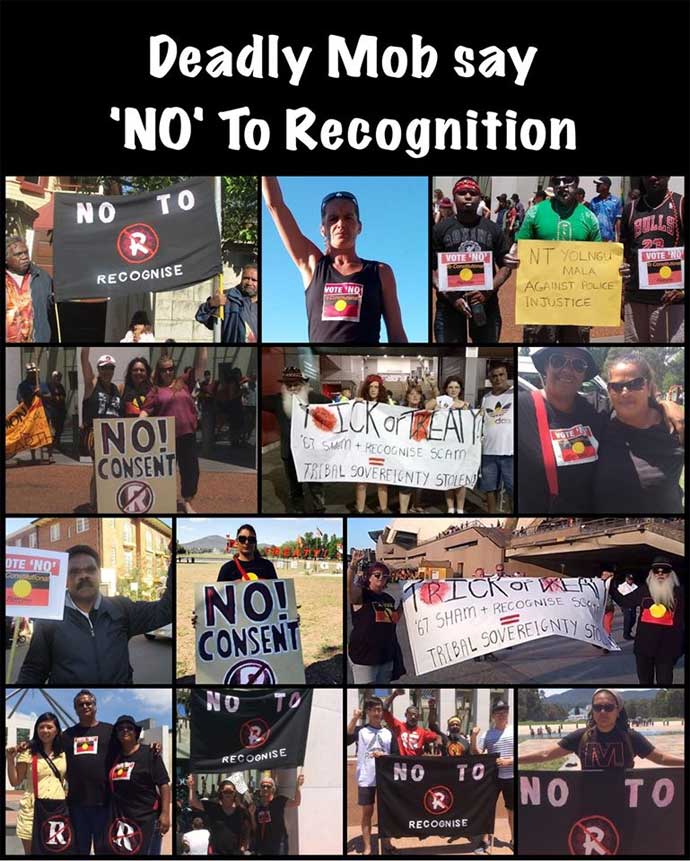Detailing the flaws and the farce of the Referendum Council's 2017 Sydney 'Dialogue'
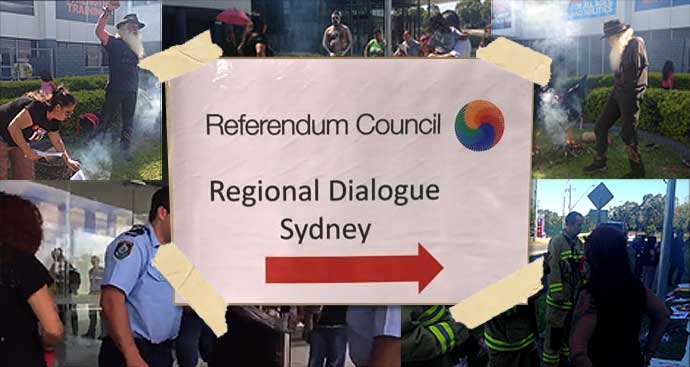
22 March 2017 Sovereign Union Volunteers
Constitutional reform to amend the Australian Constitution to 'recognise' Aboriginal and Torres Strait Islander people is a highly contentious issue. The only independent survey by IndigenousX found that 87% of Aboriginal and Torres Strait Islander people do not agree with constitutional 'recognition'.
The Referendum Council was appointed in December 2015 by Prime Minister Malcolm Turnbull and opposition leader Bill Shorten to advise on progress and the next steps to 'recognise' Aboriginal and Torres Strait Islander people in the Australian constitution. A significant proportion of the Referendum Council members are non-Indigenous business people and former politicians.
On February 10, 2016 Prime Minister Malcolm Turnbull declared that the first hurdle is to come up with a form of words for constitutional reform, and that: "It's got to speak to, it's got to sing to them, otherwise they'll wash their hands of it".
The Referendum Council is currently holding a series of 'Dialogues' at twelve locations around Australia. Attendance is by invitation only. The Sydney 'Dialogue' was held on 10 to 12 March 2017.
The 'Dialogues' – not a people's movement
The Referendum Council of the Department of Prime Minister and Cabinet are convening the 'Dialogues'. The Referendum Council has been funded $9.5 million over two financial years and has been criticised for squandering taxpayers' money by Federal Coalition Senator Dean Smith.
AIATSIS, the Australian Institute of Aboriginal and Torres Strait Islander Studies, is involved in executing the 'Dialogues'. AIATSIS was approached by the Referendum Council to conduct the meetings, and who then sought $7.5 million to run them.
On 10 February 2016, Prime Minister Malcolm Turnbull announced an additional $20 million in funding for the work of the AIATSIS Collections over two years in his 'Closing the Gap' speech. AIATSIS Chairperson Mick Dodson said the additional $20 million allocation, " will allow AIATSIS to ramp up its work to collect, preserve, understand and share Australia's Aboriginal and Torres Strait Islander peoples' heritage and culture."
It was not announced in the Close the Gap speech whether AIATSIS would be using this allocation of funds to run 'Dialogues' on behalf of the Referendum Council.
Who is attending?
The Referendum Council's website says that '60% of places are reserved for First Nations/traditional owner groups, 20% for community organisations and 20% for key individuals'. It is not stated whether they said who the key individuals are known to, or employed by, or support constitutional reform, nor is it clear how they have been selected.
Up to 100 Aboriginal and Torres Strait Islander people are attending each of the 12 sessions. According to the Referendum Council's website, five people from each 'Dialogue' will be chosen to attend the Uluru convention from 24 to 26 May 2017. However, around 10 people have been chosen from each area at these 'Dialogues' so far. This is the first example of where the Referendum Council diverges from what they say to what they actually do.
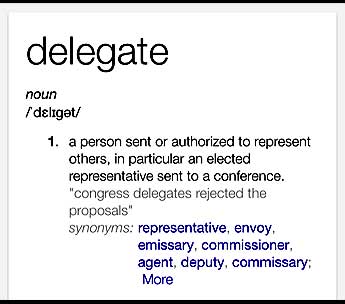
Not delegated to represent on constitutional reform
The 'Delegates' were hand-picked specifically to attend this meeting without going through a representative election process and were not specifically chosen by their communities to represent them on the matter of constitutional reform. Their selection did not meet even a western democratic standard of representation by election from the people to choose their own representatives, let alone follow First Nations' protocols.
Day One of the Referendum Council's secret Sydney 'Dialogue'
Friday 10 March was the first day of the Referendum Council's Sydney 'Dialogue'. It was held in the Rooty Hill RSL mega club. It was the start of a three-day meeting that very few people in the Aboriginal community even knew was occurring.
The Referendum Council's hand-picked attendees were comfortably ensconced in the second floor meeting room of the Rooty Hill RSL. They had been flown in and placed in luxurious hotel rooms nearby, and were hanging over the second floor balcony prior to the 'Dialogue' commencing.
It was an interesting venue choice. The first floor of the club was a veritable sea of poker machines, which keep low income earners in an endless poverty cycle and only provide true benefits to the corporations that own them. It appeared symbolic of the way that Aboriginal people are always at the bottom of Australian society, while the mainstream society and multinational corporations grow wealthy on resources and profits from Aboriginal land.
Downstairs in the RSL car park, a group of First Nations people were gathered to oppose the 'Dialogues' and the constitutional amendments. Children drew and adults painted posters on the concrete car park.
An independent journalist and photographer were the only media presence in the car park. They were refused entry to the 'Dialogue'. They had been also refused the right to film the Dubbo 'Dialogue' in February, because they were not 'delegates' and were openly supporting the 'Vote No to Constitutional Change' position.
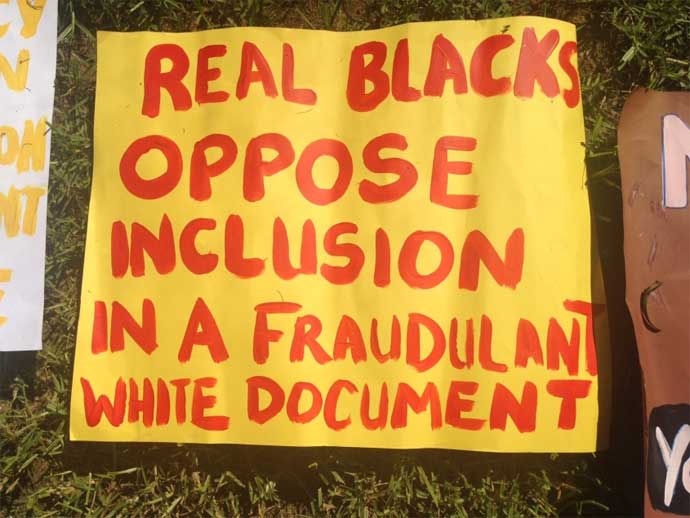
At around 1 pm the First Nations group moved as a united front to the glass doors of the RSL. They started a smoking ceremony, an ancient ceremonial practice used for tens of thousands of years to cleanse and remove negative energies. It was also a powerful way to show cultural opposition to the selective, elitist meeting taking place inside the building.
Eucalyptus smoke rose from a coolamon and a tiny boy danced proudly to clap sticks. The smoke went straight up into the second floor balcony meeting room.
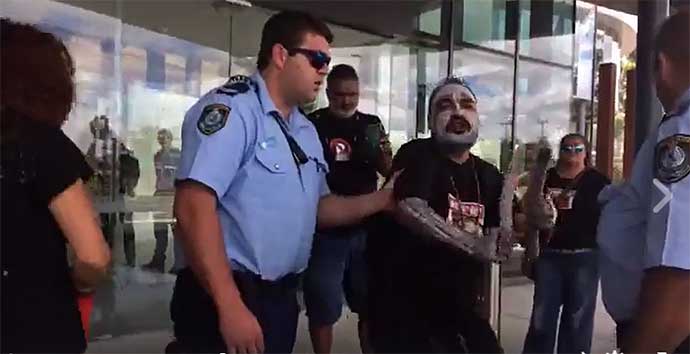
NSW Police and a fire engine arrived. They demanded that the smoking vessel be extinguished. A high- pressure water hose was blasted on the coolamon. A Yuin Elder was forcefully dragged by his arm. The children screamed in fear as the police dragged another man away (pictured above).
The 'Dialogue' that wasn't a Dialogue
Upstairs were the 100 inappropriately labelled 'delegates' who were handpicked to attend the 'Dialogue'. Also present was the co-chair of the Referendum Council, Pat Anderson, AIATSIS staff and a number of group and session facilitators.
They were all alerted to the actions of the NSW Police to the First Nations group below, but only about 10 people went over to witness what was happening under the balcony. The rest appeared to be indifferent to what was happening underneath, as they continued watching a video about historical injustices by filmmaker Rachel Perkins.
One of the 'Dialogue' facilitators, Roy Ah See, attempted to stop a few First Nations sovereign women, of the group downstairs, from entering the meeting room. Ah See is the Chairperson of the NSW Aboriginal Land Council and is a new appointee to PM Malcolm Turnbull's Indigenous Advisory Council.
Only the Referendum Council's hand-chosen 'delegates' could speak during the meeting.
Ah See was implored by a First Nations woman that to lock out Aboriginal people would be inappropriate. He then bluntly said that they could be silent observers but not participants in the 'Dialogue', and that the only ones who had the right to speak or participate were the people selected to attend.
The co-chair of the Referendum Council, Pat Anderson, described the 'Dialogues' and the Uluru convention to be held from 24 to 26 May.
"Uluru is a decision-making place. Once you get there, you can't go back to your communities and say you have to consult with them."
Uluru is only weeks away.
Adding another layer of secrecy to the meeting
The Referendum Council then imposed more rules. Only photographs taken by the Referendum Council photographers were allowed. Filming or photography of the meeting was not allowed, adding another layer of secrecy to the meeting. For such a major happening in this communication enabled era, it seems highly suspicious that there is no complete public record of the 'Dialogues' and what was said.
A set of 'Rules of Engagement' was produced
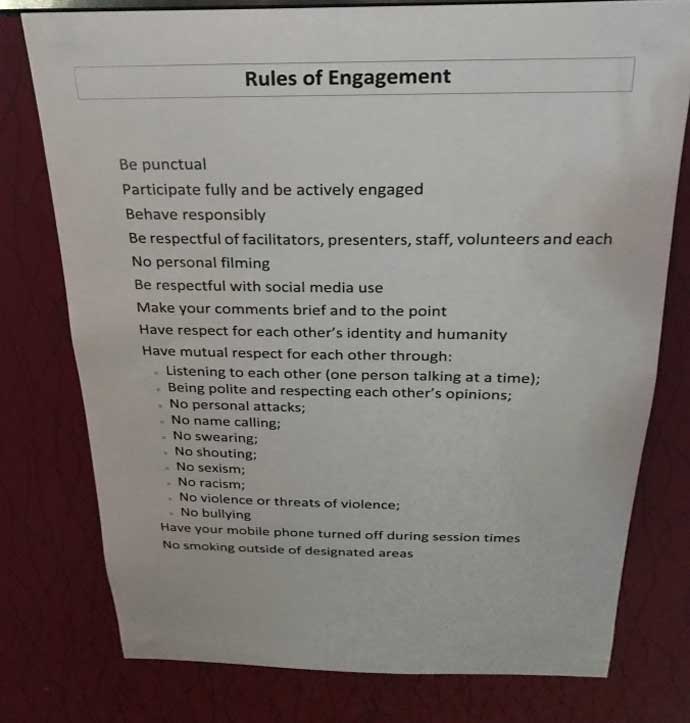
It outlined that people were not to use the microphone to make personal attacks on other people, including no swearing and bullying. As the meeting went on the Referendum Council facilitators then breached the very Rules of Engagement they claimed to be enforcing, and strained to create an absolute sense of division in the room between 'delegate' and 'observer'.
There was blatant bullying by facilitators in an attempt to gain control of the discussion. Their behaviour was designed to oppress the First Nations 'observers', and to stop them from having any opportunity to participate. It seemed like they were intent on creating two classes of Aboriginal people in the room.
There was a lot of fiery discussion, however, among 'delegates'. Interestingly, it was the case that many vocal 'delegates' did not want to have Aboriginal People forced into the Australian Constitution at all.
The issues of Sovereignty and Treaties kept getting pushed off the agenda
It was like the Referendum Council and its facilitators thought these topics were a side issue, not the key issue at the heart of the matter.
The few people who expressed any support for 'recognition' generally wanted this only if there was a Bill of Rights put into the Constitution, with special rights enshrining the unique rights of Aboriginal Peoples. One man expressed his genuine concerns about constitutional reform and was cooed at patronisingly by a facilitator, "Don't you worry yourself about that little book now" (the Constitution).
Some people talked about how, if Aboriginal People were 'recognised' in the Constitution, then Treaties must happen at the same time. The Perth 'Dialogue' had a hundred 'delegates' calling for a Treaty.
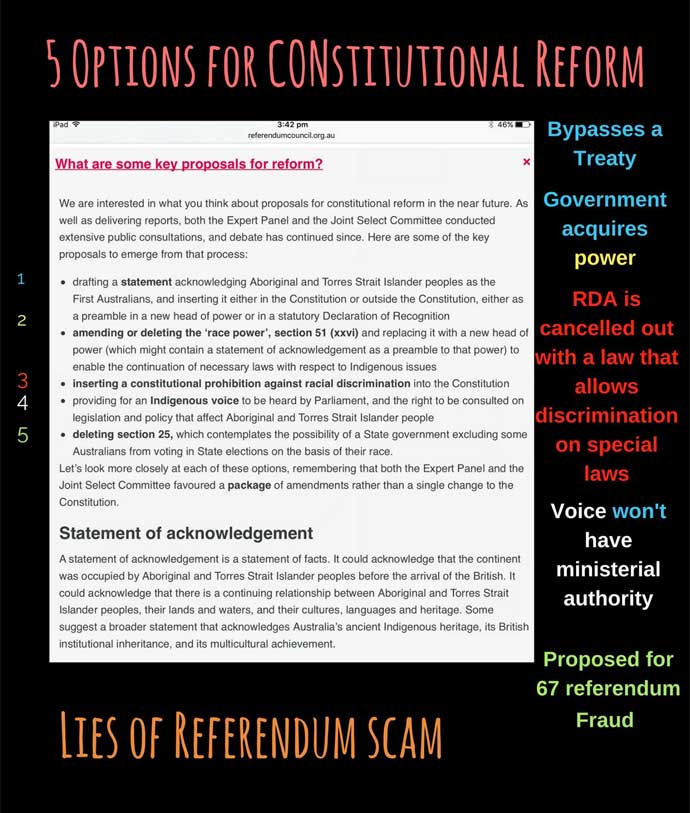
Another man asked these simple and legitimate questions of the constitutional lawyer present: "Is the Australian Constitution legal? Was it ever passed into law by the British Parliament?" The lawyer fumbled around with an evasive non-answer. And the questions still stand.
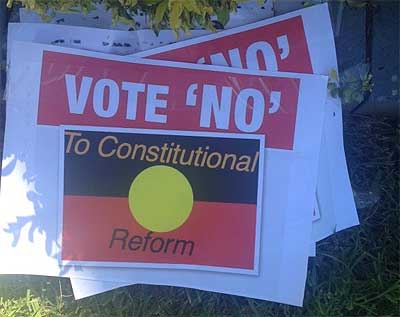
Ah See derided a Sovereign Elder who had attended the Dubbo meeting for daring to speak out, saying that it wasn't fair that the man spoke when he had spoken in February at the Dubbo meeting. Yet Ah See relentlessly controlled the mic, rambling about how hard it was for him as an Aboriginal man, and took a lot of time away from other speakers. He also shocked some with his foul language in front of small children and old people.
When two First Nations women silently unfurled a 'Vote No to Constitutional Change' banner, Ah See ranted that the banner was interfering with the speakers, and tried to get the whole group to decide to throw the women out. There were verbal threats of, "Call the police!" from the table next to the women.
He then shouted, "If you don't agree with us, just get out of here, get out now!" And then this pearler: "Between the C and the T is the UN. You be a Treaty person and you die in a ditch". Seemingly, C refers to constitutional reform, and T is referring to Treaties. There were multiple breaches of the 'Rules of Engagement' during the 'Dialogue'.
This type of behaviour does not bode well for Ah See's new appointment as a member of the Prime Minister's Advisory Council. In his own words he stated, "Maybe I'm not the right person to facilitate this meeting".
There was fury expressed by several 'delegates' at the low number of 'Dialogues'
Only 12 'Dialogues' are being held around the country. Eighteen meetings were promised at the Broome meeting, said one lady. Somehow this has now been reduced–lack of funds, apparently?
The Referendum Council was crying poor–please hop into this busted up Commodore and journey with us, we can't afford more 'Dialogues'. Another speaker commented that NSW, with the highest Aboriginal population in Australia, has a meagre two 'Dialogues' and the ACT have nothing at all.
Day two of the Referendum Council's secret Sydney 'Dialogue'
The second day descended further into malpractice as the facilitators became more aggressive in silencing the strong voices in the room from having their say. People were expressing the sentiment that 'Sovereignty was never ceded, our Law is the Law of this land, and the Australian government is still an illegal occupying power'.
When a First Nations woman asked for clarification of a single government law that has ever been positive for Aboriginal people, she received no answer from the floor and was shouted at for her efforts.
No written wording of the constitutional amendments were available ...
At the end of the second day, no written wording of the changes to the five clauses for amendment (from the government's perspective) had been provided to the group at all.
The government and whoever else has been behind constitutional reform, including the so-called 'Expert Panel' and the Referendum Council, must undoubtedly have prepared a set of their preferred wording for inclusion. It would have been carefully combed over by vastly overpaid constitutional lawyers, or they would not be asking for a decision at the end of this scripted process.
By this point in time, why are no actual proposed words to amend the Constitution available for public scrutiny? It's rumoured that the words will be released in June 2017.
Outside the RSL club, the Constitution was being burned
The First Nations people opposing constitutional 'recognition', who had remained outside the RSL club, had lit a ceremonial fire containing the ashes from a number of Aboriginal Embassies around Australia. The Australian Constitution was burnt in a billycan to the sound of clap sticks. The firefighters came again with a contingent of police. But this time the firefighters would not put out the fire, and the police left too.
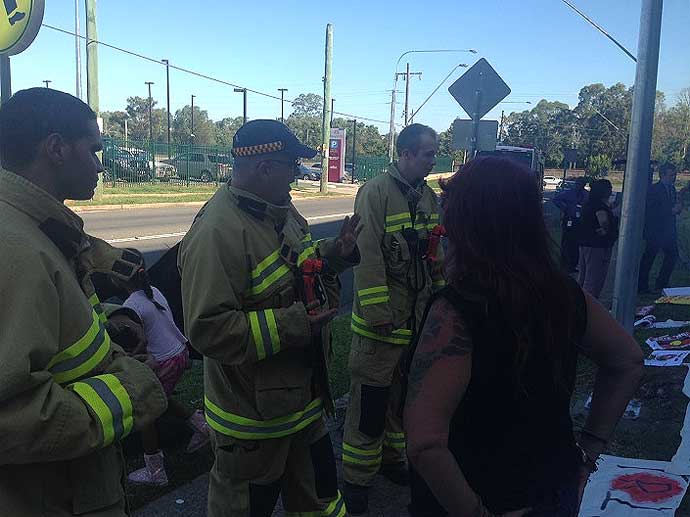
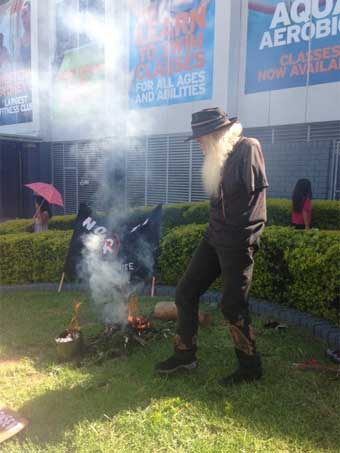
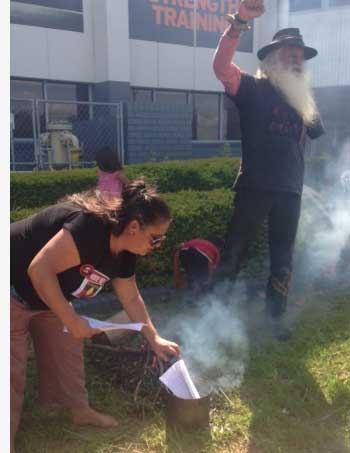
Day Three of the Referendum Council's secret Sydney 'Dialogue' - Voting Day
Day three was voting day. On the final day, the facilitators appeared confident; perhaps they thought that the cat was in the bag. So called 'delegates' were self-nominating or nominating each other to go to Uluru. Facilitators appeared to be making up the rules as they went along.
Ghillar, Michael Anderson, the only living member of the 1972 Aboriginal Embassy founding four, a leading Sovereignty activist and the Convenor of the Sovereign Union, had been a powerful voice on the room on day two. He couldn't attend the third day, yet wanted to attend at Uluru. He was nominated to attend by 'delegates' and had been chosen as a 'delegate' for the Dubbo 'Dialogue' but was not able to attend.
They said Ghillar, Michael anderson, was not a 'Delegate'
The facilitators struck Ghillar off the voting paper and didn't mention that they had done this until challenged. They then said he was not a 'delegate', even though he was listed for the Dubbo meeting as a delegate. They then made up a rule that people who were not present on voting day could not be considered as nominees. No surprises there, yet what a shame, particularly as Ghillar is an authority in the Aboriginal Sovereignty movement and understands well the reasons why the Australian Government is seeking to 'recognise' First Nations the first place.
The nominees included a number of people who hadn't spoken out, or barely spoke, over the three days, who got up and spent from only 30 seconds to several minutes talking about who they are.
Only a few explained their position that they would take to the Uluru meeting on matters of constitutional reform
Several even said during their speeches, "I've never been to Uluru before", like they thought that they were in the draw for a free holiday. A number of speakers spoke passionately about Aboriginal Sovereignty–and they didn't get elected. The votes were counted in some back room by whom, exactly, it was unclear.
Once the Referendum Council had their Uluru contingent, they couldn't have shut down the meeting faster. They had the outcome they wanted: thanks for showing up so we can photograph you, thanks for providing an appearance of consent. Have a ticket to Uluru.
The First Nations contingent outside, who were opposing 'recognition', stayed right up to the very end of the third day. Their presence, though being ignored, was undeniable.
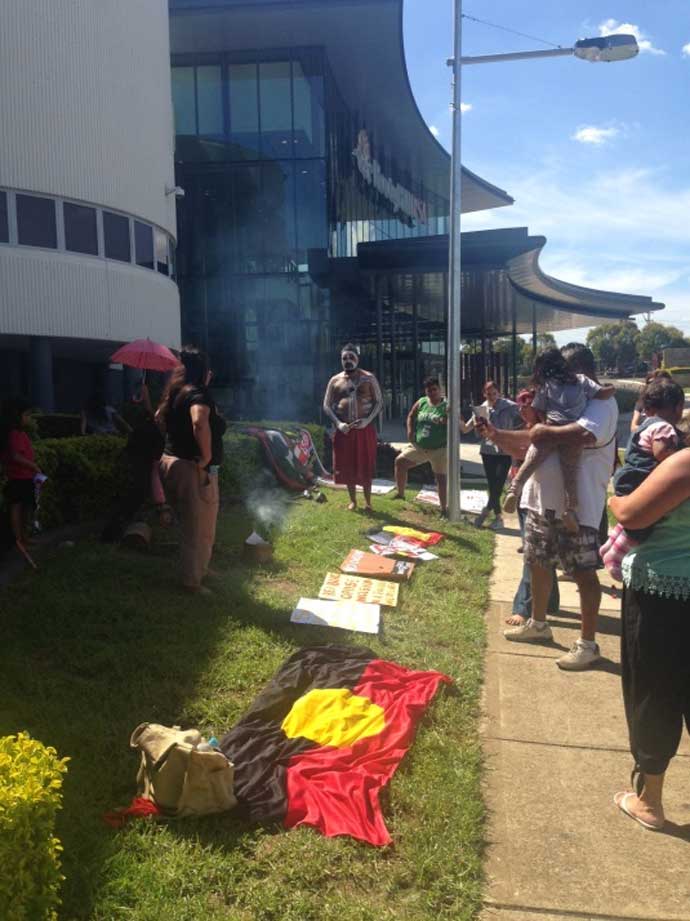
Outside the Rooty Hill RSL
The questions that need answering
The Referendum Council somehow expects 'delegates' to consult with their communities by the Uluru convention in May. Presumably though, not with any communities who don't have a 'delegate' attending, or do they actually mean all Aboriginal and Torres Strait Islander people?
They seem to expect that 'delegates' can feasibly gain free, prior and informed consent from their communities, to explain the finer nuances and implications of constitutional law even though they themselves are not constitutional lawyers, and they are to do this with no actual wording on the table. What a sick joke: where would this be seen as an appropriate protocol anywhere else in society?
So far, no amendments have been produced for scrutiny
The Referendum Council is expecting a consensus on what constitutional changes, exactly? This is like asking people to sign a blank cheque on their rights, land and the future inheritance of their children's children. And they want this to be all signed off at Uluru from 24 to 26 May.
Where is the accountability or information to the community that is independent of how the Referendum Council disperses it? There's nothing for future generations, First Nations or the wider community, to understand the 'Dialogues', or to have the history available for the record–only an empty shell of a written government record, written by a government employee.
The Referendum Council's insubstantial and watered down communique on the Sydney Dialogue doesn't even mention the key discussion topic of First Nations un-ceded Sovereignty. Their report is a hollow mockery of what occurred. How can they pretend there was unity when the last statement to the group on the last day was by a First Nations 'Delegate' announcing a huge protest–a Sovereignty convoy to Uluru to contest constitutional recognition? Why are the Referendum Council and the government being so sneaky about this?
The Commonwealth Government knows full well that it does not have a valid claim to sovereignty
Is their only solution to coerce and assimilate Aboriginal and Torres Strait Islander Peoples into the racist constitution from Britain, so that there is no First Nations' sovereign voice left? Why on earth would they expect Aboriginal people to support this?
The NSW Aboriginal Land Council had a hefty contingent of its members and executive present. Does the NSW Land Council formally support 'constitutional recognition', and if so, do their members support this position? Aboriginal land councils were created from the dream of self-determination and land justice–this is a far cry from that dream. Why were land councils so over-represented anyway? There are many other Aboriginal organisations and groups in NSW.
There is a heavy question mark over the neutrality of the 20% of community 'organisations' representation across all the 'Dialogues'
In 2015, Lateline exposed how Aboriginal organisations were been made to show support for constitutional reform as part of their key performance indicators. In Dea Theale's statement to ABC's Lateline from the Western Sydney AMS in 2015, she said:
Unfortunately, this is not a matter of opinions here or there, but a fact. The guidelines for funding applications under the Indigenous Advancement Scheme (IAS) clearly list "Progress towards a referendum on constitutional recognition, participation in society and organisational capacity" as the main program outcome for the 'Culture and Capability Programme'.
Furthermore, under Key Performance Indicators, meaning, the main indicators which applicants must demonstrate how their proposed programs will achieve if funded, the first item listed is: "Increased opportunity to participate in constitutional recognition activities" .
The message that Treaties may come after constitutional recognition has been spun by the Recognise campaign, when all along conservative governments have clearly enunciated that there will be no Treaties arising from constitutional reform.
All states have now 'recognised' Aboriginal People into their state constitutions, but the plight of Aboriginal People all over the country is no different than before this occurred and the gap is not closing. Ironically, when the State of NSW recognised Aboriginal people in its Constitution, it was accompanied by an indemnity clause releasing the NSW Government from any liability for past wrongdoings.
The process and structure of the 'Dialogues', the incredible rush, is fatally flawed. The process has an agenda from which people are expected to select one, some or all of the five models of constitutional reform proposed, but with no space to reject them outright.
Although the Referendum Council professes neutrality, the meeting agenda is not at all fairly weighted to an open discussion in the language used or in the agenda itself. They want this passed. They are pushing their agenda by all means possible.
Constitutional 'recognition' is a bipartisan Commonwealth government agenda, not a people's movement
It is being paid for by government and corporations at vast expense. If they wanted a true 'Dialogue', as the 12 national meetings are purported as being, they would have taken into serious consideration the views of all First Nations people who wanted to attend, including the Vote No campaigners outside. This could have been achieved by, at the very least, trying to listen to them to understand their perspectives.
Recognise and the Referendum Council
'Recognise' is a pro-constitutional reform public relations campaign run by Reconciliation Australia. Recognise is infamously supported by banks, mining companies, private prisons and big industry.
The Referendum Council is at pains to disassociate itself from the Recognise Campaign (but confusingly also admitted to working with it regularly). The question from the Aboriginal community about 'Recognise' has been all along, if the mining companies and big business want it, then there surely must be something for them in it–and it's not going to be good for First Nations Peoples.
The government, the Recognise campaign and the Referendum Council have unimaginable resources at their disposal to push a Yes campaign at people. Recognise has even infiltrated sports, including the AFL, NRL and cricket. Has there ever been a referendum in the history of Australia that has received this level of taxpayer and corporate funding? It seems that in Australia, referendum outcomes can be bought.
The Recognise PR juggernaut has run in tandem to steadfast opposition and protest by Aboriginal groups including Sovereign Union. There are many other strong Aboriginal run Facebook pages opposing 'recognition'. Yet the Vote No grassroots campaign has not had a single cent put towards it, despite multiple calls for a formal No campaign funded to the same extent as the Yes campaign.
The Referendum Council's processes are out of line with international principles of free, prior and informed consent
The Referendum Council's pitiful efforts are a far cry from the open Dialogue needed. Perhaps it is the case that no matter what objections are raised to constitutional recognition, or how much people talk about Treaty/ies and Sovereignty, this process appears to have a single agenda, to manufacture an appearance of consent to constitutional reform.
It's certainly out of line with the United Nations Declaration on the Rights of Indigenous People (UNDRIP) to which Australia is a signatory.
This is a further indictment on Australia in its 229-year history of genocide and oppression of First Nations Peoples. It's made even worse by the fact that Aboriginal People are being used to silence and exclude other Aboriginal Peoples' voices in this process–known as the Black Wall.
It's all about the framing, and the devil is in the detail. They'll spin it how they want from here. The Referendum Council will finish their appointment and exit the stage, a dirty stain on the pages of history. But First Nations Vote No campaigners will continue to oppose constitutional reform, despite no resources and an apparent media block out. No means No.
Unpacking the Australian government's 'political will'
One of the main arguments used by facilitators for supporting the government's push for constitutional reform is that there is current political will and bipartisan support. But the will of Aboriginal people to retain our sovereignty is far more important than the government's will to obtain it by deception.
At the same time as this insidious constitutional reform agenda proceeds, two discourses are operating. Native Title is under attack. There are ongoing human rights abuses by the Northern Territory intervention and elsewhere, the deaths in custody, abuse of incarcerated First Nations children, the suicide rates, issues that we all know about.
These indicators are getting worse, not better, and some people have swallowed a message that constitutional reform is some kind of magical panacea that will change these things for the better. But what constitutional reform actually does is to give power to the colonial system to destroy our lives, give an authority to them that we accept the right for them to make all these bad, oppressive laws on our behalf. No way can Treaty/Treaties follow this!
Aboriginal people have held this land in wisdom and Law for countless millennia.
The writing is on the wall. Don't give your consent. Aboriginal Law is the Law of this land. The world's oldest continuing culture holds the key for a future where we can all survive.
Each and every Aboriginal and Torres Strait Islander person must act now to stand up for their inherent sovereign rights. The time is now. Join in with the Sovereignty Convoy to Uluru in May, to say NO to the deal. No consent to inclusion in the racist Constitution.
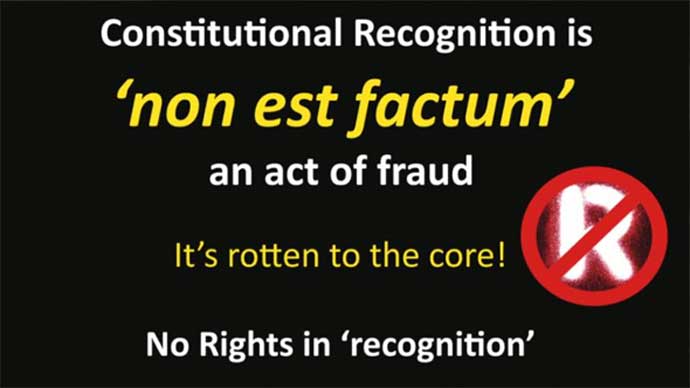
See also: non est factum Wikipedia


